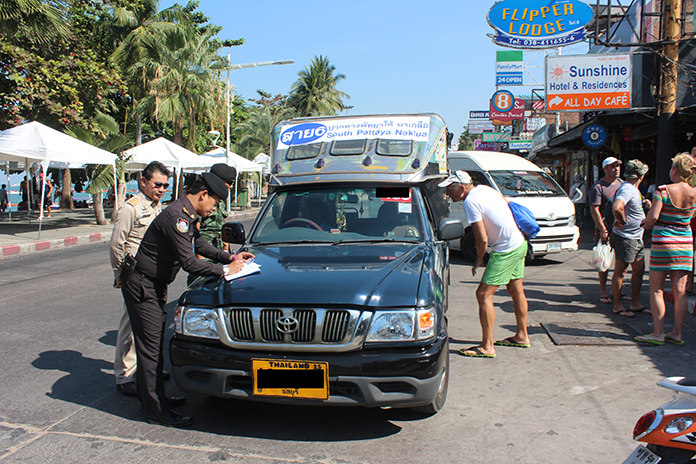The army launched its “D-Day” operation against Pattaya baht buses and taxis, impounding 32 vehicles for three days for working off their assigned routes and parking illegally.
Pattaya Police Chief Pol. Col. Apichai Krobpetch on Jan. 31 dispatched 122 administrators, Land Transport Department employees, soldiers and police around the city to catch public transport drivers stopping or parking in prohibited areas, veering off route or committing any other road violation.
He said the army declared “D-Day” against the public-transport drivers after they ignored the military’s previous dictates on traffic regulations.

In response, the military ratcheted up the penalties for infractions, which previously topped out at 2,000 baht per charge. Now, drivers will be fined a minimum 2,000 baht and a maximum 50,000 baht. In addition, violators will have their vehicles seized for three days.
Nearly three dozen drivers – many of whom undoubtedly weren’t around for the Pattaya Beach outdoor press conference earlier in the day – were caught unaware. Soldiers and police seized 32 vehicles and held them at Photisampan Temple for three days.
Manop Prapanpat, one of the penalized drivers, said he was aware that authorities had issued new rules, but said the details were never specified clearly.
He said he was assigned to work a route in Naklua, but there were too few customers to survive, so he veered off route to get more business.
Apichai said violators will be photographed and have their license and registration numbers noted so drivers can be tracked.
He said there are 289 designated bus stops in the Pattaya area. The traditional practice of simply stopping when a passenger rings the call bell – or when a passenger is spotted on the street – no longer will be tolerated. Drivers must use stops, he said, as not doing so leads to accidents and traffic congestion.
No mention was made of any effort to educate tourists and residents on exactly where those 289 stops are located.




